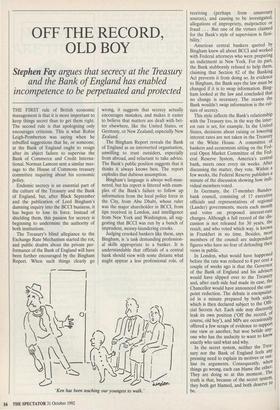OFF THE RECORD, OLD BOY
Stephen Fay argues that secrecy at the Treasury
and the Bank of England has enabled incompetence to be perpetuated and protected
THE FIRST rule of British economic management is that it is more important to keep things secret than to get them right. The second rule is that apologising only encourages criticism. This is what Robin Leigh-Pemberton was saying when he rebuffed suggestions that he, or someone, at the Bank of England ought to resign after its abject failure to supervise the Bank of Commerce and Credit Interna- tional. Norman Lamont sent a similar mes- sage to the House of Commons treasury committee inquiring about his economic policy.
Endemic secrecy is an essential part of the culture of the Treasury and the Bank of England, but, after Black September and the publication of Lord Bingham's damning inquiry into the BCCI business, it has begun to lose its force. Instead of shielding them, this passion for secrecy is beginning to undermine the authority of both institutions.
The Treasury's blind allegiance to the Exchange Rate Mechanism started the rot, and public doubts about the private per- formance of the Bank of England will have been further encouraged by the Bingham Report. When such things clearly go wrong, it suggests that secrecy actually encourages mistakes, and makes it easier to believe that matters are dealt with bet- ter elsewhere, like the United States, or Germany, or New Zealand; especially New Zealand.
The Bingham Report reveals the Bank of England as an introverted organisation, unwilling to trust outsiders, especially from abroad, and reluctant to take advice. The Bank's public position suggests that it thinks it always knows best. The report explodes that dubious assumption.
Bingham's language is always well-man- nered, but his report is littered with exam- ples of the Bank's failure to follow up information from the local police force in the City, from Abu Dhabi, whose ruler was the major shareholder in BCCI, from tips received in London, and intelligence from New York and Washington, all sug- gesting that BCCI was run by a bunch of imprudent, money-laundering crooks.
Judging crooked bankers like these, says Bingham, is 'a task demanding profession- al skills appropriate to a banker. It is understandable that officials of a central bank should view with some distaste what might appear a less professional role, of `Ken has been teaching our youngest to walk.' receiving (perhaps from unsavoury sources), and causing to be investigated, allegations of impropriety, malpractice or fraud . . . But one of the virtues claimed for the Bank's style of supervision is flexi- bility.'
American central bankers quoted by Bingham knew all about BCCI and worked with Federal attorneys who were preparing an indictment in New York. For its part, the Bank stubbornly refused to help them, claiming that Section 82 of the Banking Act prevents it from doing so. In evidence to Bingham, the Bank says the law must be changed if it is' to swap information. Bing- ham looked at the law and concluded that no change is necessary. The reason the Bank wouldn't swap information is the cul- ture of secrecy. This style inflects the Bank's relationship with the Treasury too, in the way the inter- est rate is set, for example. In the United States, decisions about raising or lowering interest rates are not taken in the Treasury or the White House. A committee of bankers and economists sitting on the Fed- eral Open Market Committee of the Fed- eral Reserve System, America's central bank, meets once every six weeks. After discussing the matter, they vote. Within a few weeks, the Federal Reserve publishes a minute of the discussion showing how indi- vidual members voted.
In Germany, the 17-member Bundes- bank council, consisting of 17 executive officials and representatives of regional (Lander) governments, meets each month and votes on proposed interest-rate changes. Although a full record of the dis- cussion is not released for 30 years, the result, and who voted which way, is known in Frankfurt in no time. Besides, most members of the council are independent figures who have no fear of defending their views in public. In London, what would have happened before the rate was reduced to 8 per cent a couple of weeks ago is that the Governor of the Bank of England and his advisers would have slipped over to the Treasury and, after each side had made its case, the Chancellor would have announced the one- point reduction. The debate is encapsulat- ed in a minute prepared by both sides, which is then declared subject to the Offi- cial Secrets Act. Each side may discreetly leak its own position (`Off the record, of course, old boy'), and MPs are occasionally offered a few scraps of evidence to support one view or another, but woe betide any- one who has the audacity to want to know exactly who said what and why. In the secret system, neither the Trea- sury nor the Bank of England feels any pressing need to explain its motives or out- line its arguments. Consequently, when things go wrong, each can blame the other. They are doing so at this moment. The truth is that, because of the secret system, they both get blamed, and both deserve to be.
In an open system of economic manage- ment people know what they are going to get, and who is responsible for the policy. America's low interest rates are the policy of the Federal Reserve Board; Germany's high interest rates are the responsibility of the Bundesbank. But to discover how a really open system works, we must look to the Antipodes. Most extraordinary things are happening in New Zealand.
The popular, and garbled, version of the revolution there is that the governor of the Reserve Bank is paid by results: the lower the rate of inflation, the higher his rate of pay. Unfortunately, this is not quite the case. What happens is that the governor is given an inflation target, and is required to adjust monetary policy to meet it. Every six months the Reserve Bank prepares a mon- etary statement that reviews the conduct of the policy in the previous six months, and outlines how it will be implemented in the six months ahead.
The New Zealand Treasury does not see this document until it is printed. If the Bank announces new interest-rate changes, the minister and his civil servants find out along with everyone else. No arm- twisting is allowed. This year's inflation target was 2 per cent. So far Don Brasch, the governor, has been over-achieving; Inflation in New Zealand at the moment is 1 per cent, but if Mr Brasch had boobed and his policies had failed to meet the inflation target, he could be out on his ear. The New Zealand system also requires that the permanent secretary of the Trea- sury has to explain why if tax receipts have not reached the required target, or if the Treasury's economic forecasts are incor- rect. (If this happened in Whitehall, 70 or so Treasury economists would become intimately acquainted with life on the dole.) After the New Zealand minister of finance has delivered his budget, anyone can ask to see the budget papers. Indeed, there is hardly anything that a casual inquirer in Wellington may not learn. `There is, however, a point at which the minister has to be allowed to panic in pri- vate,' notes one observer.
Whitehall and the Bank of England might be surprised to learn that this has not brought economic management to a standstill; on the contrary. After three hard years of this experiment, the New Zealand economy has begun to grow steadily.
Mr Lamont has said he is thinking of making a six-monthly report on monetary policy, but it is a cosmetic exercise. He has no intention of handing over responsibility for meeting his inflation target to the Bank of England. In fact, the Treasury was embarrassed by recent reports that it was considering making a draft budget avail- able for public scrutiny, and that Sir Ter- ence Burns, the permanent secretary, is proposing to open the Treasury to winds of change from outside. Press officers were briefed to say that these suggestions were untrue, exaggerated or premature.
There is no evidence that the addiction to secrecy is being broken, there or at the Bank of England: there will be no open meetings for policy discussions of the Court of the Bank like the public meetings of the Federal Reserve Board. (Decisions are still taken in private, but public meet- ings enable spectators to learn how these bankers think.) Serious discussions about whether the Bank would be better at economic man- agement if its reputation for efficiency and judgment were not undermined by repeat- ed failures of bank supervision are still banned, even after the publication of Bingham's report.
Proposals to investigate the powers of the Treasury and the Bank will be resisted, owing to a third rule of British economic management: since critics cannot discover how and why decisions are taken, you sim- ply declare that their criticism is ill- informed.
`Woke up this mornin' — felt positively bloody Kafkaesque!'



























































 Previous page
Previous page